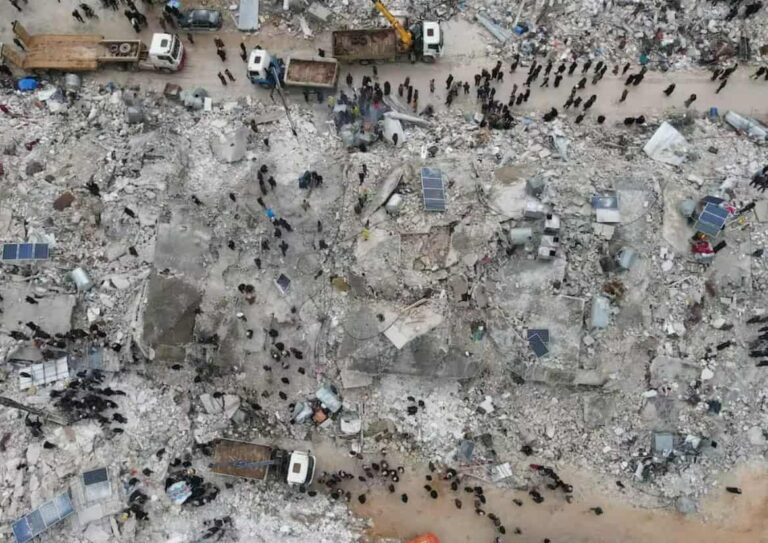The death toll from the devastating 7.9-magnitude earthquake that struck Turkey on the border with Syria has risen to more than 5,000. According to the WHO, the death toll could however reach 20,000.
Gas pipeline damage and fires have erupted from buildings, industries, and ports, and thousands of constructions are razed to the ground. This, in an area already devastated by years-long conflicts, inflation, economic crisis, as well as geopolitical and major refugee crisis.
Erdogan and the Syrian government ask the world for help: the international machine of rescue and humanitarian assistance has started.
Table of Contents
Earthquake in Turkey and Syria, the victims could be 20,000
The death toll from the earthquake that has struck Turkey and Syria since dawn Monday, February 06, 2023 is worsening by the hour. At least 5,000 people have died. Reports count a total of over 16,000 injuries. These are figures that are bound to rise as people dig through the rubble looking for survivors.
According to Catherine Smallwood, emergency manager for Europe at the World Health Organization, the dead could be as high as 20,000. This is because, as she explained, “there is always the possibility of more collapses. Unfortunately,” she noted, “the same thing always happens with earthquakes: initial reports of the number of people killed or injured increase significantly in the following week.”
President Recep Tayyip Erdogan has declared seven days of national mourning and schools across the country will remain closed until Feb. 13. Two earthquakes, four tremors ranging from 6.4 to 7.7 rattled ten different cities in what Erdogan called “the most disastrous earthquake since 1938.”
An earthquake that immediately entered the ominous list of the 10 deadliest earthquakes to hit Turkey since 1930. The country is crossed by two faults, the Anatolian and the African, to the north and south. It is generated by the rift in the Arabian plate that coincides with the southeast of the country.
The areas and cities hit by the earthquake
Hatay, Gaziantep, Kilis, Urfa, Adiyaman, Osmaniye, Malatya, Kahramanmaras, Adana, and Diyarbakir are the main cities that are now counting the dead and are facing a tally of damage. Thousands of buildings have already faced demolition because they are on the verge of collapse.
Immediately triggered the rescue machine. Which is very organized in Turkey with the civil defense AFAD unfortunately not new to this kind of intervention. Afad itself reported that the first tremor, magnitude 7.7, struck at 4:17 a.m., epicenter in Pazarcik, Kahramanmaras province, at a depth of 7 km.
The second tremor struck Gaziantep a few minutes later, magnitude 6.4, followed by a third earth tremor of grade 6.5. A grade 7.5 quake rattled Kahramanmaras province again 7 hours later, the peak of an earthquake swarm that has recorded more than 150 tremors.
Tremors reached also Iraq, Lebanon, Cyprus and Egypt, and which in Syria claimed at least 1,000 lives.
Erdogan flew in from Istanbul to Afad presidency headquarters, where he took over coordination of operations.
The international rescue and humanitarian machine started
This time, however, Turkey is facing a catastrophe of a very different magnitude. And the highly organized Afad machine may not be enough.
Erdogan specified that he has received offers of help from 45 countries outside NATO and the European Union.
Germany was the first to offer help, but Greece’s eternal friend-enemies were not absent from the roll call. As well as phone calls from French President Emmanuel Macron, whose relations with Erdogan are often problematic. And Israeli President Isaac Herzog with whom Erdogan instead patched up during 2022.
Above all, however, there was no shortage of phone calls from Ukrainian President Volodymir Zelensky and Russian leader Vladimir Putin. Inevitably, some coordination is triggered precisely between Russia and Turkey.
The Turkish-Syrian border, at the center of geopolitical disputes
Indeed, the earthquake has spawned a catastrophe affecting the Syrian-Turkish border. This is the same area with respect to which Erdogan and Putin have reached several understandings in recent years, a territory in which lie two enclaves under Ankara’s control.
The Turkish Red Cross also runs refugee camps and hospitals in the northwestern Syrian province of Idlib. Moscow has in fact been essential to keeping the Damascus regime in place for years. And it has already sent relief and aid teams to Syria, and the Russian intervention is likely to be under coordination of the Turkish one.
Meanwhile, there are reports that some 20 suspected Islamic State (Isis) fighters escaped from Rajo military prison, located near the Turkish border in northwestern Syria, during a mutiny following the earthquake.
Read also: Not only Ukraine, 10 other conflicts happening in the world today












